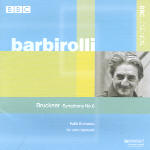This concert, captured in May, 1970 in okay stereo sound just 10 weeks before the conductor’s death, has been kicking around for a while from various sources and in varying degrees of sonic acceptability. BBC’s restoration makes the performance far more listenable than it ever has been, with the strings particularly present and balances between sections faithfully conveyed, though double basses and timpani tend to come and go. Technically speaking, it’s typical Barbirolli/Hallé: enthusiastic, occasionally inspired, often mannered, with mediocre playing that never approaches the first rank in any department. There’s a sense in which Barbirolli’s “espressivo” style really doesn’t suit Bruckner: those moments where the music demands a hands-off simplicity of phrasing, for example right after the first harp episode in the trio of the scherzo, or many places in the finale.
On the other hand, the first movement opens very impressively and stays that way right up to the recapitulation, where Barbirolli doesn’t quite know what to make of the long transitional passage leading to the second subject and so plays it too quickly. Similarly, while the final climax sounds tremendous, it would have been even more so had a better-controlled approach led up to it. The scherzo offers playing of great excitement, but the emphatically-accented principal theme, which Bruckner repeats about a million times in the movement’s outer sections, does become tiresome in the hands of the coarse Hallé brass, and the return to the opening (first time round) starts to come apart rhythmically. Still, there’s no question that the playing up to this point offers tremendous commitment and fire.
The slow movement, at a mere 23 minutes, moves relatively swiftly. Despite the shapely presentation of the opening melody, Barbirolli misses the rapt quality of the ensuing serene string choral with harp arpeggios, pressing ahead too urgently. There are some pretty serious mishaps with the Wagner tubas later on, and the strings’ brutally clipped phrasing just after the big climax’s second cymbal crash is simply a bad interpretive decision on the conductor’s part (the music cries out for a rich, legato string tone at this point). A disconcertingly casual coda cements the final, episodic impression created by Barbirolli’s italicized approach to tempo, while the blaring brass at the opening of the finale serve notice that the band seems to be getting tired–and so it proves.
Actually, the movement doesn’t really begin to fall apart until just before the recapitulation (figure Aa in the Haas edition, used here), where the violins begin to play atrociously (not that they’re anything to brag about earlier on, mind you). In an effort to keep moving through the recapitulation, Barbirolli starts speeding things up, culminating in a ridiculous accelerando leading to the cyclical return of the first movement’s principal theme. Furtwängler often does something similar in Bruckner, and with equally crude results. The great coda features too many lapses in trumpets and horns to leave much of a positive impression, and at the very end Barbirolli amends the timpani part to have the player stop his final roll a bar early and then play in unison with the last three chords: another mistake, as it turns out, since it renders those last three chords gratuitous. Bruckner’s original conception, having continuous music right up to the end, makes much better sense.
1970 was a big year for the Bruckner 8 in London. Only a few months later, in September, Jascha Horenstein led the work with the London Symphony, a concert also taped by the BBC and issued in this series. It’s a vastly more sympathetic and idiomatic performance than this one, far better played, and thoroughly recommendable in its own right (to read our review, click on “search reviews” and enter Q189 in the album/work title space, then click “search”). Barbirolli’s limited interpretive arsenal, consisting largely of exaggerated string phrasings and transitional gear shifts, often sounds generalized and lacking in point as it applies to Bruckner’s peculiar musical syntax. However loyal a following he may enjoy, there’s no doubt that Barbirolli’s finest moments as a conductor lie elsewhere.
































